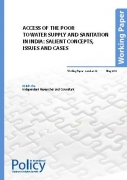 This paper by the International Policy Centre for Inclusive Growth deals with access of the poor to water supply and sanitation in India. It argues that economic, technical, institutional as well as social factors constrain access to safe drinking water and proper sanitation in India for both the urban and rural poor, and that coverage figures do not reflect this restricted access. It finds that, increasingly, communities are being required to manage their own water and sanitation schemes, not just in rural areas but in urban ones as well.
This paper by the International Policy Centre for Inclusive Growth deals with access of the poor to water supply and sanitation in India. It argues that economic, technical, institutional as well as social factors constrain access to safe drinking water and proper sanitation in India for both the urban and rural poor, and that coverage figures do not reflect this restricted access. It finds that, increasingly, communities are being required to manage their own water and sanitation schemes, not just in rural areas but in urban ones as well.
The paper deals with domestic water supply and sanitation and presents a historical overview of the phenomenon in rural and urban India. This is followed by a critique of available figures for coverage which, it is contended, seem exaggerated because they do not account for the several constraints to access. It addresses the specific institutional problems faced in the public sector delivery of these two utilities in India apart from dealing with the parallel yet thus far limited presence of the private sector in these twin arenas.
The penultimate section deals with the re-emergent paradigm of community self-reliance in terms of water supply and sanitation. It argues that three key concepts central to participatory development are at risk of being misunderstood and, therefore, misapplied by those in charge of devolving authority over water supply and sanitation schemes to the local level.
The conclusion stresses that concepts guiding policy can have profound implications for how any water supply or sanitation project is borne out in reality. Throughout the paper, reference is made to some promising technical and institutional innovations in different parts of the country that have enabled better access to safe water and sanitation by the poor.
There are definite advantages to such an institutional arrangement if the transition to community management is carried out smoothly. Often, however, the chances of success of community management are vitiated because policy makers misunderstand and misapply three interlinked concepts that are crucial to the success of community-managed water and sanitation schemes—participation; water and sanitation burden; and project ownership.
The paper concludes by clarifying these concepts and the implications they have for policy implementation in this sector.
Download the paper here